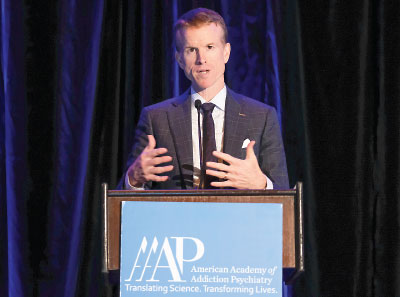Confusion Reigns Over Medical Cannabis Use
Abstract
Many states have laws allowing medical cannabis to treat conditions for which there is no evidence to support its use.

Cannabidiol products are often mislabeled and may contain substances not listed in the ingredients, says Kevin P. Hill, M.D., M.H.S.
The United States is putting policy ahead of the science regarding medical cannabis use, leading to confusion about the risks of cannabis and a market saturated with cannabidiol (CBD) products of questionable contents and use, Kevin P. Hill, M.D., M.H.S., director of the Division of Addiction Psychiatry at Beth Israel Deaconess Medical Center, told the audience in a presentation at the American Academy of Addiction Psychiatry’s 30th Annual Meeting and Scientific Sessions in December.
“We should go by the state of the science where medical cannabis is concerned, and it should be simple: Where is there evidence? Where is there no evidence?” Hill asked. “There is so much more that we don’t know than we do know.”
Currently 33 states, the District of Columbia, Guam, Puerto Rico, and U.S. Virgin Islands have laws allowing medical cannabis. Hill explained that some of these laws allow medical cannabis use for cancer, glaucoma, AIDS, hepatitis C, amyotrophic lateral sclerosis, Crohn’s disease, Parkinson’s disease, and multiple sclerosis (MS), but that data suggest that the majority of people with state-issued medical cannabis cards do not have one of those conditions. “Many are using it for unspecified reasons,” he said.
Yet among 50 trials of cannabinoids, mainly cannabis, there is high-quality evidence for just a few uses, according to Hill: chronic pain, neuropathic pain, chemotherapy-induced nausea and vomiting, and spasticity associated with MS.
“It’s not that there is no reason to think of it [as potentially helpful], but what laws say is different from the evidence,” Hill said. The gap between science and lawmaking extends beyond medical cannabis to CBD, Hill added.
“Only [the CBD] Epidiolex is approved [by the Food and Drug Administration] at this point, and 99% of the CBD your patients are using is not Epidiolex. It’s not registered, and it’s often mislabeled,” he said. “When you buy CBD products, you’re not really sure what you’re getting. You may be getting THC, dextromethorphan, or other substances.”
Not only are the labels not clear, some of the manufacturers make claims that Hill called “outrageous,” such as claims that CBD is proven to help with insomnia when there is no such evidence, or that it is absorbed into the bloodstream through the skin, which it is not.
Hill acknowledged that cannabis use is most likely here to stay, noting that roughly 22 million Americans used cannabis in the past year, and 10% of these people reported use for medical purposes. Therefore it is important to make policy based not on popular opinion, but on scientific evidence about the potential risks and benefits of using cannabis, he said.
“The loudest voices in this debate [over legalization] are often people who have political and financial skin in the game. That makes it difficult for patients to understand the risks and makes it difficult for us to help them understand,” Hill said. “The trends of [increasing] use are ominous when the perception of risk is not clear. We can provide a service to patients and colleagues by being informed and thoughtful on the topic of medical cannabis and CBD.” ■



